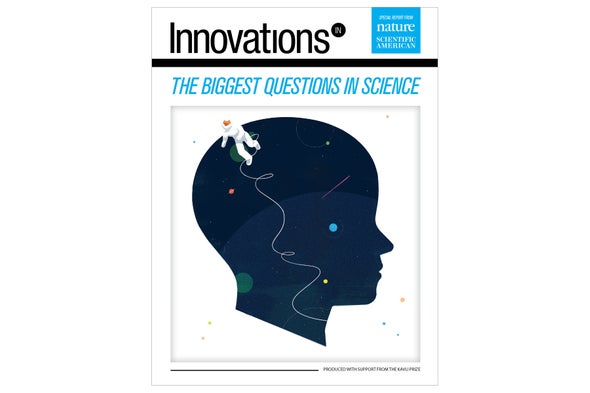|
The Biggest Questions in Science时间:2019-07-30 An editorially independent special report on research into fundamental scientific mysteries, produced with support from The Kavli Prize 编者按:这是一篇特别报告,列出的都是“科学中的最大问题”,很有趣,但是从中也可看出现在思想的缺陷,为什么不将“什么是科学”拿出来讨论? 这篇文章或可以代表现在人对科学认识的最高水平。作者理所当然的认为,对问题研究的方法和思想没有问题,由此罗列出一些现在人很难研究,很难看清楚的问题。其实科学本身的方法和思维方式才是现在的最大问题,包括自然科学,对很多问题的看法与对社会的研究一样,只是凭着经验、想象。最近我们对宇宙科学有一个小小的讨论,这一学科不是不需要研究,而是有很多研究在现实不具备条件,不可操之过急。该放下来的,就应当暂时放下,待条件成熟,再做推进。 以“科学之手”对所有的研究作分类排队,社会的研究才是最重要的。这篇文章没有将社会的研究列入科学,也不可能将它列入科学,这是现实的局限。若思想水平略有提高,将社会的研究也列入进来,科技战、贸易战、核武、中东问题、思想的颓废、民粹主义、世界观、价值观等才是现实人类——现在科学中的最大问题。回到现实,什么是科学?则是更重要的问题。
“We are all in the gutter, but some of us are looking at the stars,” Oscar Wilde wrote. Ever since an early human sat by the glowing embers of a fire on a winter night, as others fell asleep and the camp quietened, we have pondered the mysteries of existence. What are those points of light studding the sky? What are these movements within my belly? Where did this life come from? What is life? How do I protect this being from all harm? Such questions have occupied not only ordinary humans through the ages but also philosophers and, later, scientists. In recent centuries we have learned so much—and such marvelous things—about the worlds around and within us that it may sometimes seem that no nook is left unexplored, no miracles left for us to unravel. The truth is, though, that every new discovery leads us to ever deeper questions. We know what the stars are, but their motion defies explanation. We can look into the farthest crannies of the universe, but the more we see, the more we suspect that we may never, truly, understand it all. We have a good idea of how the body works, but the mind remains elusive. We know what life is but not where that first spark came from. We can observe unimaginably minute objects, but the more we try to control them, the more they seem to evade our grasp. This special report on “The Biggest Questions in Science,” which is being published in both Scientific American and Nature, is sponsored by the Kavli Prize. It was produced independently by Scientific American and Nature editors, who have sole responsibility for all the editorial content. Beyond the choice to sponsor this particular topic, the Kavli Prize had no input about the content of the articles in this package. TABLE OF CONTENTS What Is Spacetime? This article was originally published with the title "Looking at the Stars" in Scientific American 318, 6, 54 (June 2018) doi:10.1038/scientificamerican0618-54 具体参见原文:https://www.scientificamerican.com/article/the-biggest-questions-in-science/ 上一篇重回古代——假如中国对人性的研究没有停滞下一篇目录 |


